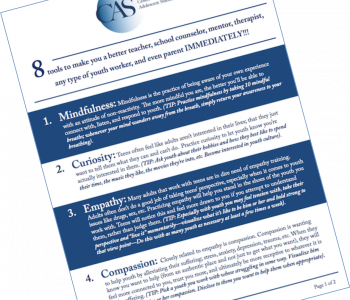

Guest post by Jeff Nalin, Psy.D. of Paradigms of San Francisco
3 Ways Traumatic Events in the Lives of Teens Impact Substance Abuse
No one wants to think about their teenager dealing with trauma, nor do they want to think about their teen abusing drugs or alcohol. Unfortunately, these two events are not only common for teens to experience, but they are also intrinsically linked. Understanding why experiencing a traumatic event places a teen at greater risk for substance abuse is the first step toward protecting your child from the dangers of addiction.
Teens Attempt to Use Drugs to Mask the Pain
Traumatic events, such as witnessing a death or being bullied, can lead to mental health conditions such as PTSD and depression. Teenagers who have never experienced the symptoms associated with these conditions before will often turn to substance abuse as a way of managing uncomfortable symptoms. For this reason, it is important to talk to teens about the potential danger of falling into drug abuse as they heal from a trauma. Parents should also be alert for signs that a child is experiencing difficulty overcoming the effects of a traumatic event. Insomnia, nightmares, reliving the event and feeling numb are all signs that a teen may be struggling with post-traumatic stress disorder, and these signs may also tempt teens to use drugs to cope.
Negative Peers Often Come Across as Understanding
When adolescents experience a trauma, they often feel different from what they consider normal. This is especially common when a teenager is sexually abused or bullied since these types of traumatic situations can generate feelings of shame and worthlessness. For many teens that do drugs or abuse alcohol, low self-esteem is a trigger that prompts them to start since they figure that their life has no meaning anyway. Compounding the issue, their former friends may also separate when they cannot understand his/her new negative way of thinking. As a teen separates from their old social group, they may begin to replace their friends with people who understand their new negative mindset. Sadly, many of these peers may also be involved in substance abuse, and their influence can encourage a vulnerable adolescent to try using drugs as a way to heal from their tragedy.
Substance Abuse Can Lead to Further Trauma
Once a teenager begins to abuse drugs or alcohol, they may place themselves in situations that leave them vulnerable to being traumatized all over again. For example, a teen that runs with an older crowd may be sexually assaulted when they are under the influence of drugs and are unable to defend themselves. Alternatively, they could witness a violent crime while they are on a drug run. Just the realization that they are not in control anymore due to addiction is also traumatizing, and the shock of withdrawal symptoms can often mimic the symptoms of post-traumatic stress syndrome, which exacerbates the condition.
When teenagers are dealing with a traumatic event, it is important to stay alert for signs that they are struggling. While one teenager may experience extreme anxiety, another may say they are fine when really they are not. Since substance abuse and recent traumas are closely linked, making sure that your child has the support of a mental health professional as well as your entire family is the best way to prevent long-term repercussions that can follow a traumatic incident.
About the Guest Author
Dr. Nalin is a Licensed Clinical Psychologist (PSY17766), a Certified Chemical Dependency Intervention Specialist and a Certified Youth Residential Treatment Administrator. Dr. Nalin is the Founder and Clinical Director of Paradigm Malibu and Paradigm San Francisco Adolescent Treatment Centers. He has been a respected leader in the field of emotional health, behavioral health and teen drug treatment for more than 15 years. During that time, Dr. Nalin has been responsible for the direct care of young people at multiple institutions of learning including; The Los Angeles Unified School District, the University of California at San Diego, Santa Monica College, and Pacific University. He was instrumental in the development of the treatment component of Los Angeles County’s first Juvenile Drug Court, which now serves as a national model.
Related Posts
Compassion Can Help You Work with Trauma-Impacted Youth
The Five Major Types of Drugs Used by Teens
How Our Own ACEs Impact Trauma Work with Youth
Substance Abuse Treatment Does NOT Happen in a Vacuum
For ongoing training on trauma-informed care and building authentic connections with those you work with, join our monthly professional development calls! Learn more about our FREE Training Community and join us now!

